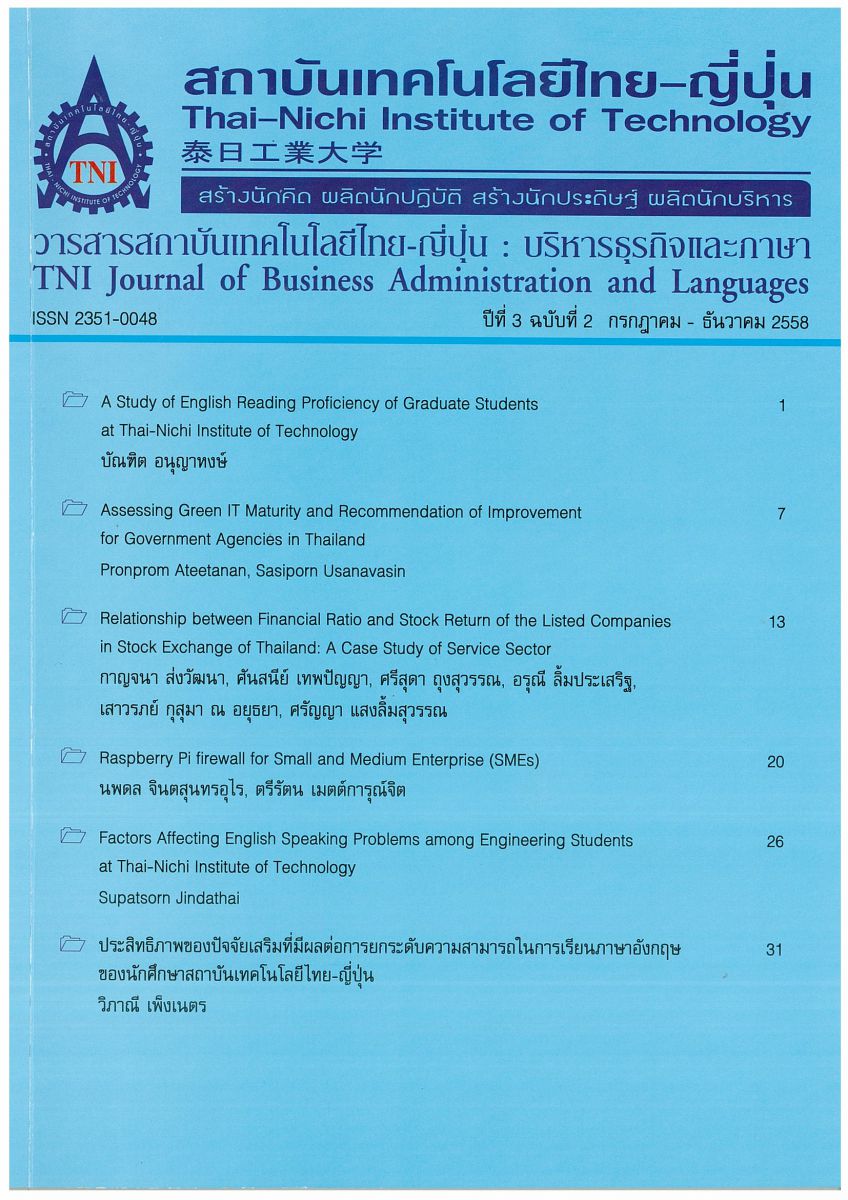Factors Affecting English Speaking Problems among Engineering Students at Thai-Nichi Institute of Technology
Main Article Content
บทคัดย่อ
The aim of this study is to identify the factors which affect English speaking problems among engineering students at Thai-Nichi Institute of Technology (TNI). This study looked at five aspects: attitude, motivation, personality, exposure to English, and management in teaching and learning English. The study also examines the comparison of the causes of English speaking problems according to students’ gender. Selfcompiled questionnaires were distributed to 154 first-year and second-year engineering students and conducted during the first semester of the academic year of 2013 at TNI. Stratified random sampling technique was applied. Statistics used for analysing the data were frequency, percentage, mean, standard deviation, and t-test. The findings showed that the main causes of the students’ English speaking problems were management in teaching and learning English, exposure to English, and personality. These factors were identified at a moderate level. However, motivational and attitude factors were identified at a low level of problem. This present study discusses these findings and makes implications for increasing students’ opportunity to acquire a higher level of English speaking proficiency.
Article Details
นโยบายการรับบทความ
กองบรรณาธิการวารสารสถาบันเทคโนโลยีไทย-ญี่ปุ่น มีความยินดีรับบทความจากอาจารย์ นักศึกษา และผู้ทรงคุณวุฒิในสาขาบริหารธุรกิจและภาษา ที่เขียนเป็นภาษาไทยหรือภาษาอังกฤษ ซึ่งผลงานวิชาการที่ส่งมาขอตีพิมพ์ต้องไม่เคยเผยแพร่ในสิ่งพิมพ์อื่นใดมาก่อน และต้องไม่อยู่ในระหว่างการพิจารณาของวารสารอื่นที่นำส่ง ดังนั้นผู้สนใจที่จะร่วมเผยแพร่ผลงานและความรู้ที่ศึกษามาสามารถนำส่งบทความได้ที่กองบรรณาธิการเพื่อเสนอต่อคณะกรรมการกลั่นกรองบทความพิจารณาจัดพิมพ์ในวารสารต่อไป ทั้งนี้บทความที่สามารถเผยแพร่ได้ประกอบด้วยบทความวิจัย ผู้สนใจสามารถศึกษาและจัดเตรียมบทความจากคำแนะนำสำหรับผู้เขียนบทความ
การละเมิดลิขสิทธิ์ถือเป็นความรับผิดชอบของผู้ส่งบทความโดยตรง บทความที่ได้รับการตีพิมพ์ต้องผ่านการพิจารณากลั่นกรองคุณภาพจากผู้ทรงคุณวุฒิและได้รับความเห็นชอบจาก กองบรรณาธิการ
ข้อความที่ปรากฏภายในบทความของแต่ละบทความที่ตีพิมพ์ในวารสารวิชาการเล่มนี้ เป็น ความคิดเห็นส่วนตัวของผู้เขียนแต่ละท่าน ไม่เกี่ยวข้องกับสถาบันเทคโนโลยีไทย-ญี่ปุ่น และคณาจารย์ท่านอื่น ๆ ในสถาบัน แต่อย่างใด ความรับผิดชอบด้านเนื้อหาและการตรวจร่างบทความแต่ละบทความเป็นของผู้เขียนแต่ละท่าน หากมีความผิดพลาดใด ๆ ผู้เขียนแต่ละท่านจะต้องรับผิดชอบบทความของตนเองแต่ผู้เดียว
กองบรรณาธิการขอสงวนสิทธิ์มิให้นำเนื้อหา ทัศนะ หรือข้อคิดเห็นใด ๆ ของบทความในวารสารวิชาการ สถาบันเทคโนโลยีไทย-ญี่ปุ่น ไปเผยแพร่ก่อนได้รับอนุญาตจากผู้นิพนธ์อย่างเป็นลายลักษณ์อักษร ผลงานที่ได้รับการตีพิมพ์ถือเป็นลิขสิทธิ์ของวารสารสถาบันเทคโนโลยีไทย-ญี่ปุ่น
หากต้องการสอบถามข้อมูลเพิ่มเติมที่
- กองบรรณาธิการ วารสารสถาบันเทคโนโลยีไทย-ญี่ปุ่น
- ฝ่ายวิจัยและนวัตกรรม สถาบันเทคโนโลยีไทย-ญี่ปุ่น
เลขที่ 1771/1 สถาบันเทคโนโลยีไทย-ญี่ปุ่น ซอยพัฒนาการ 37-39 ถนนพัฒนาการ แขวงสวนหลวง เขตสวนหลวง กรุงเทพมหานคร 10250 ติดต่อกับคุณพิมพ์รต พิพัฒนกุล (02) 763-2752 , คุณอาริสา จิระเวชถาวร (02) 763-2600 Ext. 2704 Fax. (02) 763-2754 หรือ E-mail: JBAL@tni.ac.th
เอกสารอ้างอิง
THE NATION (2013), Preparing for the AEC Era. [Online]. Available: https://www.nationmultimedia.com/opinion/Preparing-for-the-AECEra-30181887.html/
K. Kitao. (1996) Why do we teach English? The Internet TESL J.,2, 4, p.1 -3. [Online]. Available: https://www.aitech.ac.jp/-iteslj/
S. El-Raghy, Quality engineering education: student skills and experiences. Global J. of Engng. Educ., 3,1, p.25-29, 1999.
S. Mokkarawut, “An investigation of factors affecting English speaking”, (unpublished case study), King Mongkut’s institute of Technology NorthBangkok, Thailand, 2006.
Y. Muangmood, “Factors effecting entering students’ ability to speak English”, (unpublished research paper), Ayuthaya: Rajamangalar University of Technology Suvanabhumi Phranakhon Si Ayuthaya Wasakri campus, Ayuthaya, Thailand, 2005.
L. Wanthansut, “The problems of English speaking of Mattayom Suksa 1 students at Phosai Pittayakarn school, Uhonrachathani Educational Service Area 2”, (unpublished Master’s thesis), Ubonrachathani Rajabhat University, Ubonrachathani, Thailand, 2008.
J. Rubin and I. Thompson, How to be more successful language learner, USA: Heinle, 1994.
J. Holmes, An introduction of sociolinguistics, New York: Longman Group UK Limited, 1992.
R.C. Gardner and W.E. Lambert, Attitudes and motivation in second language learning. Rowley, Massachusetts: Newbury House, 1972.
W. Littlewood, Foreign and second language learning, language acquisition research and its implications for the classroom. New York: Cambridge University Press, 1983.
R.C. Gardner, Social psychology and second language learning: The role of attitude and motivation, London: Edward Arnold, 1985.
R. Oxford and Shearin, “Language learning motivation: Expanding the theoretical framework,” The Modern Language Journal, 1994.
S.H. McDonough, Fundamental concepts of language teaching, London: Allen & Unwin, 1981.
J. Harmer, The practice of English language teaching, (3rd impression, 1992), England: Longman, 1991.
M. E. Ehrman, Understanding second language learning difficulties, Thousand Oaks, California: SAGE Publication, 1996.
S. Krashen, The input hypothesis: Issues and implication, London: Longman, 1985.
P. Skehan, Individual differences in second language learning, London: Edward Arnold, 1989.
S.H. McDonough, Psychology in foreign language teaching, London: George Allen & Unwin, 1986.
M. Swain, Communicative competence: Some roles of comprehensible input and comprehensible output in its development. In S.M. Gass and C.G. Madden (eds.), Input in second language acquisition, Rowley, MA: Newbury House, 1985.
J.E. Briere, “Variables affecting native Mexican children learning Spanish as a second language,” Language Learning, vol. 28, no.1, 1987.
H.S. Lubega, “The effect of the nature and amount of exposure on language: a study based on English language proficiency of students in six Uganda schools”, Diss, University of York, 1979.
S. Lunpraphan, “A study on problems in learning English of diploma in vocational education students at ST. Joan of ARC’s technology school, (unpublished Master’s thesis), Srinakharinwirot University, Bangkok, Thailand, 2007.
J. Onkoa, “A survey study of the factors affecting learning to speak English of the employees at Star Microelectronic (Public) Co., Ltd”, (unpublished Master’s research paper), Thammasat University, Bangkok, Thailand, 2009.
K. Sirilukkananan, “A survey of the attitudes of nursing students at Saint Louis College concerning the need and problems in English communication”, (unpublished Master’s Art degree), Naresuan University, Thailand, 2007.
D.A.Wilkin, Second-language learning and teaching, United Kingdom: Billing & Sons, 1975.
T. Toosiri, “A survey study of the problems in learning to speak English of second-year students, Business English program at North Bangkok college’, (unpublished Master’s degree thesis), Language Institute, Thammasat University, Bangkok, Thailand, 2005.
S. Vithikul, “A survey study of the problems in learning speaking English of Matthayom 6 Science and Art program students at Satriwithaya school”, (unpublished Master’s degree thesis), Language Institute, Thammasat University, Bangkok, Thailand, 2005.
M. Thaneeyapanich, “A study of motivation and attitudes of high school students learning English as the second language,” (unpublished Master’s degree thesis), Language Institute, Thammasat University, Bangkok, Thailand, 2012.
S. Jindathai and A.G. McAdam, “Problems in learning to speak English of university students at Thai-Nichi Institute of Technology”, ICBIR 2014, Bangkok, Thailand.
S.D. Ghazvini amd M. Khajehpour, “Attitudes and motivation in learning English as second language in high school students,” Science Direct, vol. 5, 2011.


